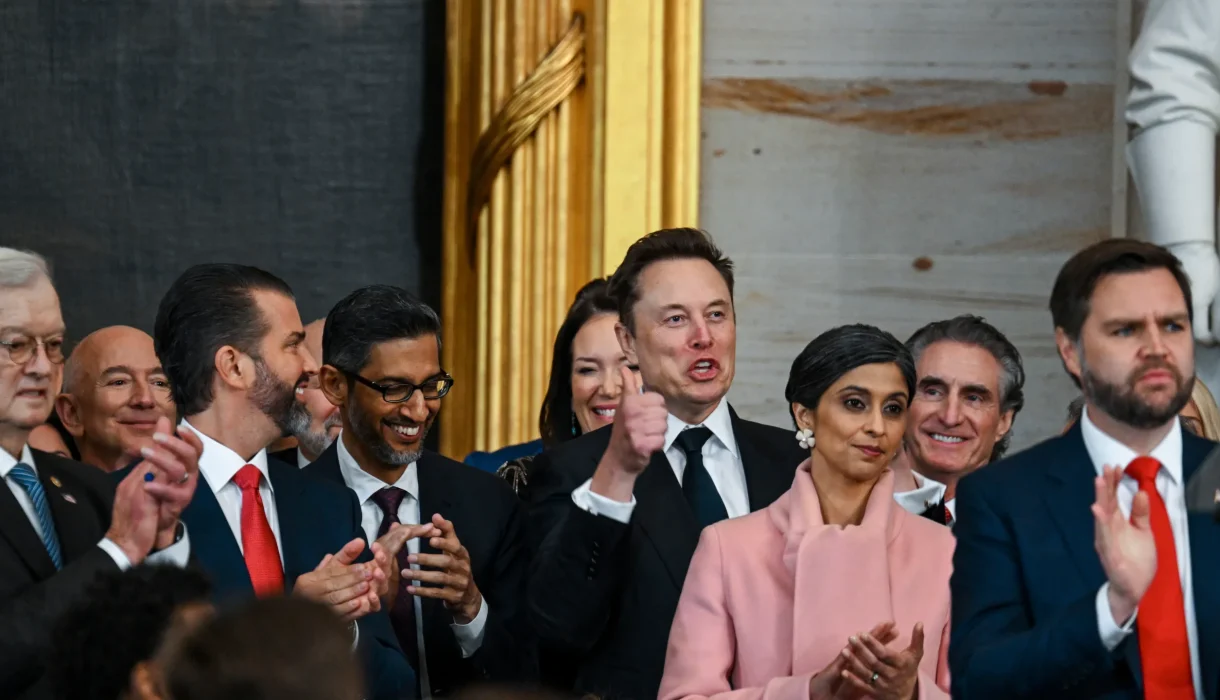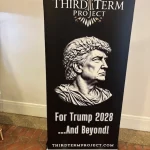
Unmasking the New Age GOP: JD Vance’s Rise in a Complex Landscape
Posted in :
JD Vance and the GOP’s Identity Shift: Power, Tech, and Populism
Exploring the intricate web of JD Vance’s political rise, touching on his controversial views, relationships with big tech, and the evolving identity of the Republican Party in modern times.
As JD Vance strides toward the forefront of political discourse, some are left wondering how a man once seen as an observer of rural struggles and cultural nuances could transform into a GOP torchbearer. This post will dissect Vance’s tumultuous journey, shaped by his relationships with controversial figures like Peter Thiel and the very fabric of what it means to be a Republican today. Through anecdotes and analysis, we’ll examine the paradigm shift within a party that continually reshapes itself to fit the narratives of its leading voices.
The Redefinition of Republican Identity
In recent years, the Republican Party has seen a significant shift in its identity. A key figure in this transformation is JD Vance. He stands out as a contrast to traditional conservatives. But how exactly does he differ?
JD Vance vs. Traditional Conservatives
JD Vance, known for his memoir “Hillbilly Elegy,” has become a prominent voice in the GOP. Unlike many established Republicans, he challenges the status quo. For instance, he openly criticizes figures like Mitch McConnell, labeling them as outdated and too liberal. This is a bold stance, especially in a party that has long valued loyalty to its leaders.
Vance’s rhetoric often reflects a new kind of conservatism. He argues that the traditional Republican ideals no longer resonate with the average American. Instead, he focuses on issues that he believes matter to the working class. He emphasizes the struggles of everyday people, particularly those from rural backgrounds. This is a departure from the more elite-focused narratives of past Republican leaders.
The Evolution of Republican Values
The values of the Republican Party have evolved significantly in the 21st century. Once centered on fiscal conservatism and strong national defense, the party now grapples with a broader range of issues. Vance embodies this evolution. He taps into cultural grievances and economic anxieties that many Americans feel today.
- Focus on Identity Politics: Vance often speaks to the frustrations of those who feel left behind by globalization and technological change.
- Anti-Establishment Sentiment: He aligns himself with a growing anti-establishment movement within the party, appealing to voters who distrust traditional political elites.
- Populist Rhetoric: Vance’s language often reflects a populist tone, positioning himself as a champion for the “forgotten” Americans.
This shift is not just about Vance. It reflects a broader trend within the GOP. Many Republicans are now questioning long-held beliefs. They are reevaluating what it means to be conservative in today’s America.
The Influence of Tech Billionaires
Another significant factor in the redefinition of Republican identity is the influence of tech billionaires. Figures like Peter Thiel have played a crucial role in shaping the party’s direction. Thiel’s financial support for Vance is a prime example. He has donated millions to Vance’s campaign, helping to elevate his profile within the party.
This relationship raises questions about the future of the GOP. Are tech billionaires steering the party towards a new ideology? Vance’s alignment with Thiel suggests a shift towards a more libertarian and nationalist agenda. This is a stark contrast to the traditional Republican focus on free markets and limited government.
Moreover, Vance’s rhetoric often critiques established institutions, including higher education. He argues that these institutions have failed to represent the interests of the American people. This aligns with Thiel’s own views on the need for a radical rethinking of societal structures.
As JD Vance continues to rise within the Republican Party, his influence is undeniable. He represents a new wave of conservatism that challenges traditional ideals. With the backing of tech billionaires and a focus on populist issues, Vance is reshaping what it means to be a Republican in the 21st century. The implications of this shift are profound, not just for the party, but for American politics as a whole.
Big Tech and Political Opportunism
In the landscape of modern American politics, few figures have stirred as much debate as JD Vance. His connections with tech billionaire Peter Thiel have raised eyebrows and sparked discussions about the implications for governance. What does it mean when a political figure aligns closely with a wealthy benefactor? This question is at the heart of Vance’s political journey.
Vance’s Ties with Peter Thiel
Vance’s relationship with Thiel is not just a casual acquaintance. It is a partnership that has significantly influenced his political career. Thiel, known for his libertarian views and substantial financial backing, has been a pivotal figure in Vance’s ascent. In fact, Thiel reportedly donated around $15 million to support Vance’s Senate campaign in 2022 through a super PAC. This kind of financial support raises critical questions about the nature of political influence.
- Does this financial backing compromise Vance’s ability to represent the interests of his constituents?
- How does Thiel’s ideology shape Vance’s political positions?
Vance’s shift from a critical stance on Trump to becoming a vocal advocate for him, following Thiel’s support, illustrates the power of wealth in shaping political ideologies. It suggests a troubling trend where political allegiance may be swayed by financial incentives rather than genuine conviction.
The Relationship Between Wealth and Political Ideology Today
Today, the relationship between wealth and political ideology is more pronounced than ever. Wealthy individuals like Thiel have the resources to influence political narratives and outcomes. This raises the question: Are politicians becoming mere puppets of their wealthy donors? The answer seems to lean towards yes, especially in cases like Vance’s.
Moreover, the emergence of the “new right,” a faction characterized by anti-woke sentiments and skepticism towards big business, showcases how wealth can drive political movements. Vance’s alignment with this group highlights a broader narrative: the intertwining of capitalism and governance.
Case Studies of Tech-Funded Political Movements
Vance’s story is not an isolated incident. There are numerous case studies of tech-funded political movements that illustrate this trend. For instance, the Koch brothers have long been known for their extensive funding of conservative causes. Their influence has shaped policies and ideologies across the political spectrum.
Similarly, organizations like the Heritage Foundation have become instrumental in promoting nationalist agendas, with Vance as a notable ally. These examples underscore a critical point: when wealth and politics collide, the outcome often favors the interests of the affluent, sidelining the needs of the average citizen.
Exploring the Implications
The implications of these relationships are profound. They suggest a political landscape where the voices of the wealthy overshadow those of the general populace. Vance’s advocacy for working-class values, juxtaposed with his support for policies that benefit the affluent, reveals a contradiction that cannot be ignored.
As Vance navigates his political career, the critique of fundraising in modern politics becomes increasingly relevant. The reliance on wealthy benefactors can lead to a governance model that prioritizes the interests of a few over the many. This raises a crucial question: How can democracy thrive when it is heavily influenced by money?
In conclusion, JD Vance’s ties to Peter Thiel and the broader implications of wealth in politics paint a concerning picture. The intertwining of capitalism and governance may shape the future of political ideologies in ways that challenge the very foundations of democracy.
Cultural Dynamics: A New Conservatism
Understanding Rural Narratives in Modern Conservatism
In today’s political landscape, rural narratives play a crucial role in shaping modern conservatism. These stories reflect the experiences of individuals living in less urbanized areas, often highlighting their struggles and triumphs. JD Vance, a prominent figure in the Republican Party, embodies this shift. His memoir, Hillbilly Elegy, serves as a lens through which many can understand the complexities of rural life and its impact on political beliefs.
Vance’s upbringing in Middletown, Ohio, was marked by challenges. He faced a chaotic childhood, influenced by his mother’s struggles with addiction. This background is not just a personal story; it resonates with many voters who feel overlooked by mainstream politics. Vance’s narrative emphasizes that it’s not merely about economic hardship; it’s about the narrative we tell about our communities.
The Intersection of Personal Background with Larger Political Themes
Vance’s life story intersects with broader political themes. His experiences reflect the sentiments of many Americans who feel disconnected from the political elite. The struggles he faced are emblematic of a larger narrative about the white working class. This demographic often feels that their voices are drowned out by more affluent, urban populations.
- Vance’s chaotic childhood highlights the impact of personal experiences on political beliefs.
- His rise from poverty to success illustrates the American Dream, albeit with significant challenges.
- These personal stories resonate with voters who share similar backgrounds.
By sharing his journey, Vance connects with those who feel marginalized. He taps into a sense of nostalgia for a time when hard work was rewarded. This connection is vital for modern conservatism, as it seeks to reclaim the narrative around rural America.
Social Structures and Their Role in Shaping Vance’s Viewpoints
Social structures significantly influence political viewpoints. Vance’s experiences in both rural and urban settings provide him with a unique perspective. His time in Kentucky with his grandparents offered stability, contrasting sharply with his earlier life. This duality shapes his understanding of the challenges faced by rural communities.
As Vance himself has noted,
“It’s not just about economic hardship; it’s about the narrative we tell about our communities.”
This statement underscores the importance of storytelling in politics. It emphasizes that the way we frame issues can have a profound impact on voter behavior.
Moreover, societal patterns today show a shift in how voters engage with political issues. Many are looking for candidates who understand their struggles. They want representatives who can articulate their experiences and advocate for their needs. Vance’s narrative is a response to this demand, offering a voice to those who feel unheard.
In conclusion, the dynamics of modern conservatism are deeply intertwined with personal narratives and social structures. Vance’s story exemplifies how individual experiences can shape broader political themes. His rise in the Republican Party reflects a growing recognition of the importance of rural narratives in American politics.
Future Implications for the GOP
The rise of JD Vance in the Republican Party has sparked significant discussion about the future of American conservatism. His approach reveals much about the GOP’s trajectory. Vance’s narrative intertwines personal stories with political strategy, raising questions about the ethics of such tactics. As the Republican Party evolves, it’s crucial to consider the implications of this shift.
What Vance’s Approach Reveals About the GOP’s Trajectory
Vance’s political journey is emblematic of a broader trend within the GOP. He has positioned himself as a voice for the working class, drawing from his own tumultuous upbringing. His memoir, Hillbilly Elegy, is a prime example of how personal narratives can resonate with voters. But what does this mean for the party?
- Personal Stories as Political Tools: Vance’s rise suggests that personal experiences may become a staple in political discourse. This could lead to a GOP that prioritizes individual narratives over traditional party platforms.
- Shift in Focus: The party might pivot towards more populist themes, emphasizing relatable stories that connect with voters on an emotional level.
However, this shift raises ethical questions. Are politicians like Vance using their stories to manipulate public sentiment? Or are they genuinely reflecting the struggles of their constituents? The line between authenticity and opportunism can be thin.
Interrogating the Ethics of Using Personal Narratives for Political Gain
The ethics of leveraging personal narratives in politics is a contentious issue. Vance’s background is compelling. He overcame significant challenges, including a chaotic childhood and family struggles. Yet, one must ask: is it right to use these experiences as a political weapon?
Critics argue that such tactics can oversimplify complex issues. By framing personal stories as the primary lens through which to view policy, important structural challenges may be overlooked. For instance, Vance’s focus on cultural issues often diverts attention from systemic problems affecting the working class.
The question remains: Are we prepared for a future where personal stories overshadow party platforms?
This question is critical as the GOP navigates its identity in the coming years. If personal narratives dominate, will the party lose sight of its foundational principles? Or will it adapt to a new reality where emotional resonance is paramount?
Visions for the Future of American Conservatism
As Vance and others like him gain prominence, the future of American conservatism may take on a different shape. The GOP could evolve into a party that embraces a blend of personal storytelling and populist policies. This transformation could lead to a more inclusive approach, but it also risks alienating traditional conservative values.
- Potential for New Leadership: Vance’s rise may embolden future candidates to adopt similar strategies. This could create a new wave of leaders who prioritize personal narratives.
- Policy Shifts: The GOP might shift its focus towards issues that resonate more with the average American, such as economic inequality, while still maintaining a conservative stance.
In conclusion, the implications of JD Vance’s approach are profound. As the Republican Party grapples with its identity, the blending of personal narrative and political strategy could signify a deeper transformation within American conservatism. The challenge will be to balance emotional appeal with substantive policy. The future of the GOP may depend on how well it navigates this complex landscape. The stakes are high, and the journey ahead is uncertain.
TL;DR: JD Vance’s ascent in the Republican Party highlights a complex narrative marked by his personal history, the influence of big tech, and a shifting cultural background that challenges traditional conservatism.
PoliticalOpportunism, CulturalConservatism, ModernConservatism, RepublicanParty, HillbillyElegy, BigTechInfluence, PeterThielRelationships, JDVance
#RepublicanParty, #PeterThielRelationships, #CulturalConservatism, #HillbillyElegy, #JDVance, #ModernConservatism, #BigTechInfluence, #PoliticalOpportunism,#JDVance, #GOP, #RepublicanParty, #PeterThiel, #AmericanPolitics, #BigTech, #Populism, #HillbillyElegy, #ConservativeShift, #PoliticalNarrative, #NewRight

